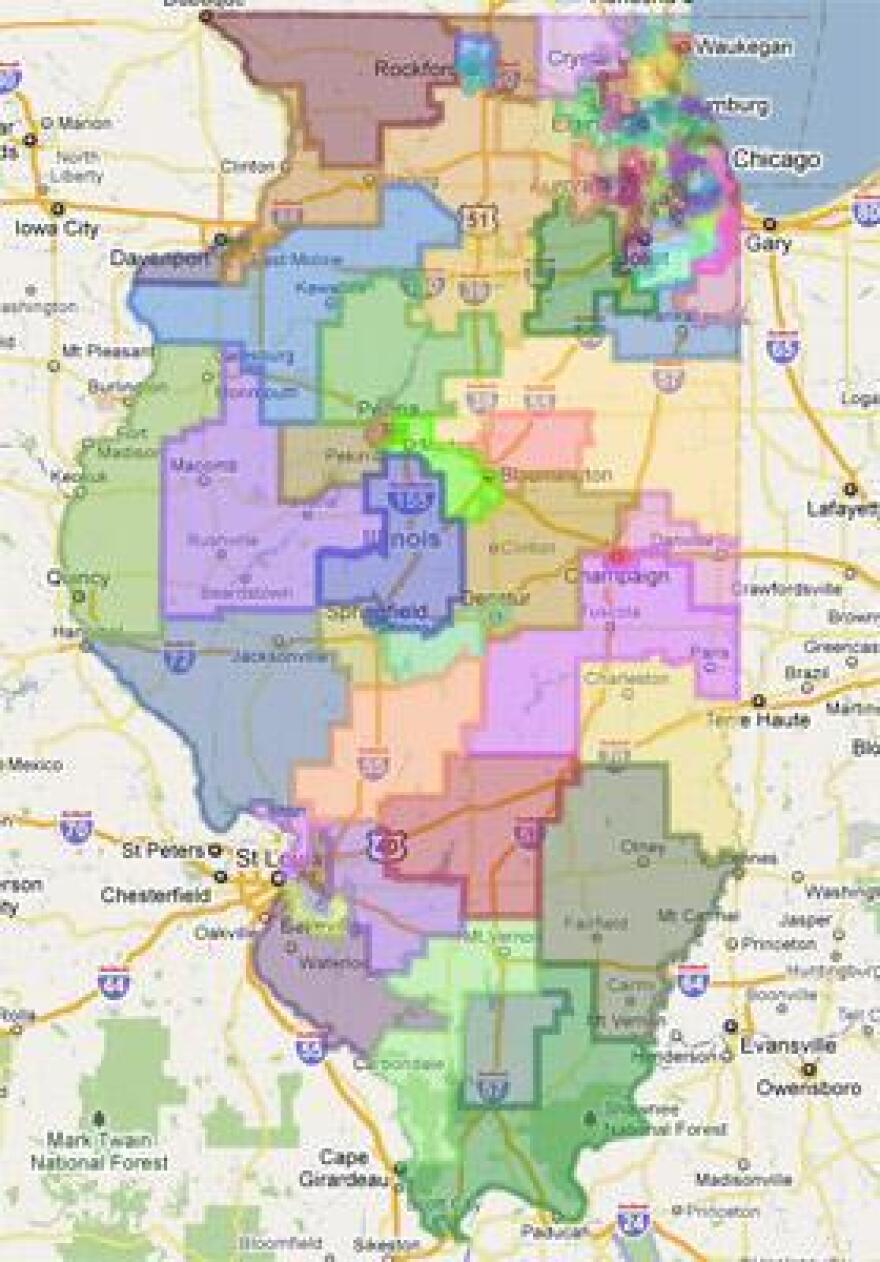Illinois Republicans are blasting Gov. JB Pritzker for walking back a pledge he made while running for governor in 2018, when he said he’d veto any legislative maps drawn by lawmakers, political party leaders or their staff.
Democrats — who hold veto-proof supermajorities in the General Assembly — are in the thick of a once-in-a-decade redistricting season, racing to craft new legislative and congressional maps and get Pritzker’s signature by June 30. Blowing that deadline would mean Democrats risk losing their partisan advantage in the mapmaking process.
Read more: Illinois To Lose 1 Congressional Seat After Census Shows State Lost Population For First Time
Though the governor three years ago vowed to veto maps drawn in the manner they’re currently being drafted, Pritzker on Tuesday reiterated a recent line, saying he would veto any “unfair” map. He and other Democrats have melded their definitions of “fair” and “unfair” maps in the last few months, saying whatever maps get approved for the next 10 years must reflect Illinois’ diversity, and follow both the federal Voting Rights Act and Illinois’ similar state statute.
Pritzker three years ago said the state’s constitution should be amended to hand over lawmakers’ map-making power to an independent commission. But in answering questions on the campaign trail, then-candidate Pritzker went further than his fellow Democratic competitors during the 2018 primary season, backing Gov. Pritzker of 2021 into a corner.
“We should amend the constitution to create an independent commission to draw legislative maps, but in the meantime, I would urge Democrats and Republicans to agree to an independent commission to handle creating a new legislative map,” Pritzker’s campaign told multiple media outlets in 2018.
Republicans and good-government activists have repeatedly called on the General Assembly to follow Pritzker’s three-year-old advice and appoint an independent commission to draw the maps, even absent a constitutional amendment. But they’re fighting a losing battle against Democrats who see no reason to give up their mapmaking power — a power that has allowed the party to dominate state politics for decades, making Illinois a solidly blue state in a sea of red.
When confronted with his own words on Tuesday, Pritzker attempted to recast his previous statement.
“I have also said that in order for us to have an independent commission, we needed to have a constitutional amendment — something that would actually change the way the process operates today in the Constitution,” Pritzker said. “That did not happen.”
A 2016 citizen-led referendum to put an amendment allowing for an independent redistrict commission on the ballot was blocked by the Illinois Supreme Court, because the plan did not meet stringent criteria for constitutional changes that begin outside of the legislature. But similar proposals have not gotten far in the Democratic-controlled General Assembly either — even those put forward by those in the majority party.
Illinois House Republican Leader Jim Durkin (R-Western Springs) rebuked Pritzker, taunting that the governor “seems to suffer from retrograde amnesia.”
Other Republicans piled on, including U.S. Rep. Rodney Davis (R-Taylorville), who is one of five GOP members of Illinois’ congressional delegation with an uncertain future. The U.S. Census Bureau on Monday confirmed Illinois will lose one congressional seat, and Democrats have eyed taking out Davis’ 13th district. Davis, in turn, has floated running for governor or U.S. Senate if that happens.
“Governor Pritzker lied to people of Illinois, plain and simple,” Davis said in a statement Tuesday. “When he was a candidate for Governor in 2018, Pritzker made an ironclad promise to voters that he would veto any redistricting proposal that was drawn by legislators. That turned out to be a lie. Now that he’s in power and the Democrats have maintained their supermajority control of the General Assembly, Pritzker is enabling a partisan redistricting process that will be used to tighten his party’s grip on power for another decade.”
The GOP also pointed fingers to Pritzker and decades of Democratic political control in Illinois on Monday, when the U.S. Census Bureau revealed Illinois lost net population for the first time in more than 200 years after the 2020 Census.
But Pritzker had words for Republicans too, calling many “carnival barkers” who he said attempted to “run down the state” by predicting Census numbers would show mass exodus from Illinois. Instead, the official figure is a quarter million people more than the most recent Census estimate, and shows Illinois lost about 18,000 net residents over the last decade.
The governor also derided GOP members of the House and Senate committees overseeing redistricting as obstructionist.
“I hope that Republicans will choose to work with Democrats on the map,” the governor said. “Right now it looks like they’re just saying ‘no,’ they’re not really engaging and all they’re doing is fighting in these redistricting hearings, which I think have been so important for hearing what people across the state really want in a redistricting map.”
State Rep. Tim Butler, the GOP spokesman on the House’s redistricting committee, took umbrage with Pritzker’s jab. Speaking on the House floor Tuesday, Butler said he was fully “engaged,” and pointed out that he’d introduced legislation identical to Democrats’ previous measures calling for an independent redistricting commission.
“Well let me tell you, Governor, I’m engaged,” Butler said. “I would say it’s not the Republicans who are not engaging. I would say it’s your friends in the Democratic Party that aren’t engaging. We need to have you hold to your word, Governor, that you will veto — veto — a partisan map.”
Butler's proposal has not moved, and Democrats maintain handing the process over to a panel outside of the legislature would be unconstitutional.
Republicans would get a 50/50 shot at controlling the map-making process if lawmakers and the governor fail to approve new legislative maps by June 30, but Democrats are loath to make that high stakes gamble. They didn’t a decade ago when the party controlled the governor’s office and both the Illinois House and Senate, and Pritzker on Tuesday described the maps Illinois has been living under for the past 10 years as pretty fair.
In previous decades of divided government, the mapmaking process was handed over to an eight-member bipartisan commission after lawmakers couldn’t approve new maps by June 30, as prescribed by Illinois' constitution. If that commission doesn’t reach agreement by Aug. 10, a ninth partisan tie-breaking member is chosen by Sept. 5 for a final deadline a month later.
Republicans and good government groups say they'd prefer the process going to the appointed commission if they can't convince Democrats to hand over mapmaking power to an independent commission — a very unlikely prospect.
Additionally, detailed Census data usually given to states for redistricting by April the year after a decennial Census will be delayed until at least mid-August, and could be as late as the end of September. Democrats say they can't wait for that data, especially given the Oct. 5 final maps deadline laid out in the state's constitution.
The eight-member panel only ever reached agreement in 1971 — the year after Illinois’ current constitution was ratified. A tiebreaker was chosen in 1981, 1991 and 2001, with Democrats winning partisan advantage twice, and Republicans once in 1991, when their map propelled the GOP to control of the Illinois Senate for a decade.






